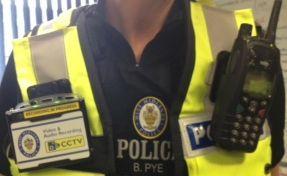With incidents of police violence and brutality fresh in the nation’s mind, the Louisiana State Legislature will consider House Bill 183 during the current legislative session to provide more law enforcement oversight.
The bill, authored by Rep. Dalton Honoré (D- Baton Rouge), would require on-duty officers to wear body cameras to record their contact with people. According to the bill’s digest, law enforcement agencies would be required to keep the recordings for two years, though they would not be available to the public.
The bill’s digest states officers will wear a camera on the chest or at eye level at all times and should record the contact from beginning to end. Officers would be required to inform the person they are being recorded, unless it is unsafe or impractical.
Body cameras are currently used by some state law enforcement agencies, including the New Orleans Police Department. Some parishes already have laws regarding police body cameras, so Honoré thinks the bill has a good chance of passing during the session.
“I see it’s a fast growing instrument around the country,” Honoré said. “It’s already in operation in the state of Louisiana in several of the parishes and local cities.”
The bill requires law enforcement agencies to establish policies and training for officers in the proper use of the cameras. The law would also require agencies to participate in state and federal programs that provide funds to purchase and maintain body cameras.
In 2014, President Obama announced he would request Congress allocate $75 million for police body cameras as part of a $263 million spending package for police department reform.
The costs associated with maintenance, data storage and the cameras themselves need to be considered, LSUPD spokesperson Capt. Cory Lalonde said in an email.
“An obvious concern would be the financial impact it would create,” Lalonde said in the email. “We have to wait to see if the bill would pass and what the final version would be if it does become law.”
The issue of body cameras hit the national spotlight after the shooting of Michael Brown by police officer Darren Wilson in Ferguson, Missouri, and the topic flared up again after former police officer Michael Slager was charged with murder after shooting Walter Scott in South Carolina.
The South Carolina incident included a video of Slager shooting Scott, who was running away from the officer.
The bill will not completely stop such incidents, but it is a step in the right direction, said history junior Blair Elizabeth Brown.
“It’s a good measure,” Brown said. “It isn’t necessarily a cure-all. I want to be hopeful and say that it will prevent things from happening, but at the same time, you still have corruption and systematic corruption.”
A study published in March 2013 by Rialto, California, Police Department Chief Tony Farrar showed over a 50 percent reduction in use-of-force incidents, according to the Police Foundation. Use-of-force is defined as the use of physical restraint to gain control over an unruly person or situation.
Brown said legislators and law enforcement agencies should try to fix the underlying cause of these incidents, in addition to passing the bill.
“It’s questionable why we need to have these cameras,” Brown said. “It just shows how much trust is being lost in the system. We really need to train these officers better.”
Louisiana bill could require police to wear body cameras while on duty
April 13, 2015
More to Discover








